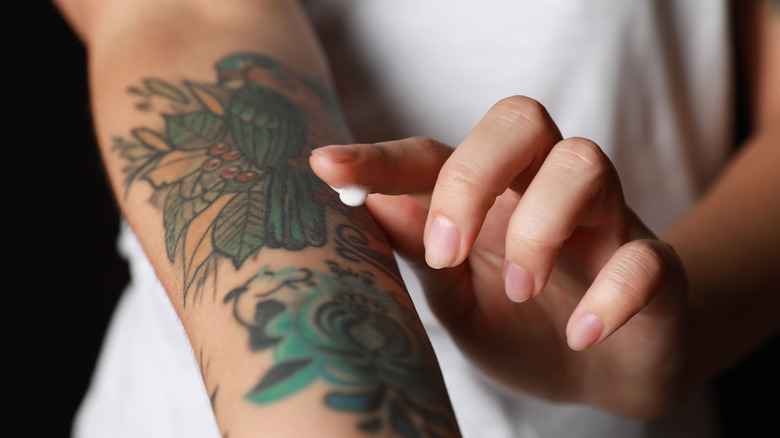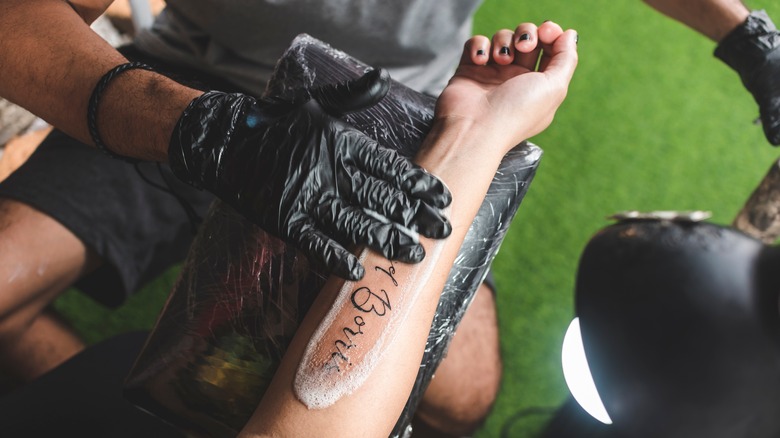When Can You Use Lotion On A Healing Tattoo (& What Kind Should You Use)?
New tattoos can be exciting, fun, and can even boost your mental health. However, taking care of them while they're healing can be a bit of a pain. Knowing when, how, and what to apply to your skin post-tattoo can be confusing. Since the commitment is fairly long, making sure you nail the early days of your tattoo care can be important for ensuring the long-term health and appearance of your new tattoo. Between the oozing, bleeding, and scabbing, you might be wondering how a moisturizer is supposed to help the situation. As Liz Goold, general manager of Nice Tattoo Parlor in New York explained to Cosmopolitan, "After you get a tattoo, the skin is in a vulnerable state, and moisturizing can help it heal properly."
Goold elaborated on why exactly moisturizing is the key to tattoo healing, "If you don't moisturize — which even I'm guilty of with a few of my tattoos — your tattoo can develop hard scabs that can cause the ink to fall out with the scab." In this way, moisturizing is not only key to ensuring your tattoo heals properly but can also improve the longevity of the ink, especially if your tattoo uses colored inks which have more of a tendency to fade than black ink. Let's dive into moisturizing your tattoo and what products you should look into if you have fresh ink.
When to use lotion
First and foremost, you should make sure to listen closely to your tattoo artist's aftercare instructions. This can be especially important if you're getting more traditional old-school tattoo techniques such as hand poking, rake-and-strike, or Tebori. Different methods of ink infusion into and under your skin can call for very different aftercare instructions. For more common forms of tattoos, the general rule of thumb is to moisturize regularly. The key is to keep your healing tattoo from drying out (which can lead to scabs and scars). After your initial dressing comes off — which can vary depending on whether your artist chooses gauze, plastic wrap, or possibly even a 'second skin' style adhesive immediately after finishing your tattoo — make sure to clean and dry the area before applying moisturizer.
After that, you should plan on washing and drying your tattoo at least once or twice a day during the healing process, making sure to moisturize the area only when your tattoo has dried. If you live in a drier climate or at a higher elevation you will more than likely need to apply lotion more consistently than someone in a humid climate. Not only can moisturizing help you survive the peeling stage, but as the healing process progresses, regular moisturizing can also help to relieve the inevitable itching that accompanies tattoo healing. Make sure to pay close attention to your skin to keep track of whether you should moisturize more or less frequently.
What kind of lotion you should use
The most important part of any moisturizer you choose for your tattoo aftercare is that it is a gentle formula that is fragrance and alcohol-free. Since your skin is healing, avoiding irritants and harsh chemicals is key to ensuring your skin can heal without extra complications. Your tattoo artist might recommend a specific brand or lotion, but there are strong debates within the tattoo community regarding what products are the best. While some warn you should stay away from petroleum products (like Vaseline) because they block necessary airflow to a new tattoo, others swear by the healing power of Aquaphor Healing Ointment. This classic consistently shows up on most lists for aftercare tattoo lotions and with good reason, but it's important to assess your skin to see what might work best for you.
With that being said there are many lighter options for those who might not enjoy the thick texture of Aquaphor. These include lotions from Cetaphil, Aveeno, and Lubriderm in addition to a whole slew of balms, salves, and lotions that are branded as being made specifically for tattoos. It can be useful to switch from a thicker ointment to a lighter lotion after the first week or so of aftercare, once your skin has started to really heal. The main thing to remember is to avoid fragrances, alcohol, dyes, and any additives that can actually have the opposite intended effect by drying your skin and tattoo out. Happy healing!


